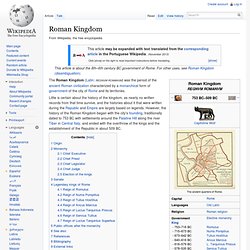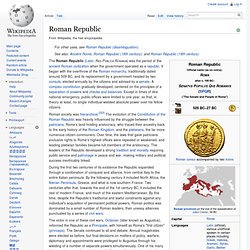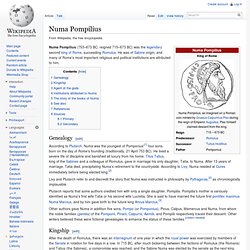

Roman Kingdom. The Roman Kingdom (Latin: REGNVM ROMANVM) was the period of the ancient Roman civilization characterized by a monarchical form of government of the city of Rome and its territories.

Little is certain about the history of the kingdom, as nearly no written records from that time survive, and the histories about it that were written during the Republic and Empire are largely based on legends. However, the history of the Roman Kingdom began with the city's founding, traditionally dated to 753 BC with settlements around the Palatine Hill along the river Tiber in Central Italy, and ended with the overthrow of the kings and the establishment of the Republic in about 509 BC. Origin[edit] The traditional account of Roman history, which has come down to us through Livy, Plutarch, Dionysius of Halicarnassus, and others, is that in Rome's first centuries it was ruled by a succession of seven kings.
Monarchy[edit] Chief Executive[edit] Chief Priest[edit] Chief Legislator[edit] Chief Judge[edit] Early Rome. Roman Republic. The Roman Republic (Latin: Res Pvblica Romana) was the period of the ancient Roman civilization when the government operated as a republic.

It began with the overthrow of the Roman monarchy, traditionally dated around 509 BC, and its replacement by a government headed by two consuls, elected annually by the citizens and advised by a senate. A complex constitution gradually developed, centered on the principles of a separation of powers and checks and balances. Except in times of dire national emergency, public offices were limited to one year, so that, in theory at least, no single individual wielded absolute power over his fellow citizens. During the first two centuries of its existence the Republic expanded through a combination of conquest and alliance, from central Italy to the entire Italian peninsula.
By the following century it included North Africa, the Iberian Peninsula, Greece, and what is now southern France. Roman Empire. Numa Pompilius. Numa Pompilius (753–673 BC; reigned 715–673 BC) was the legendary second king of Rome, succeeding Romulus.

He was of Sabine origin, and many of Rome's most important religious and political institutions are attributed to him. Genealogy[edit] According to Plutarch, Numa was the youngest of Pomponius'[1] four sons, born on the day of Rome's founding (traditionally, 21 April 753 BC). He lived a severe life of discipline and banished all luxury from his home. Titus Tatius, king of the Sabines and a colleague of Romulus, gave in marriage his only daughter, Tatia, to Numa. Livy and Plutarch refer to and discredit the story that Numa was instructed in philosophy by Pythagoras,[2] as chronologically implausible. Plutarch reports that some authors credited him with only a single daughter, Pompilia. Kingship[edit] After the death of Romulus, there was an interregnum of one year in which the royal power was exercised by members of the Senate in rotation for five days in a row.